-
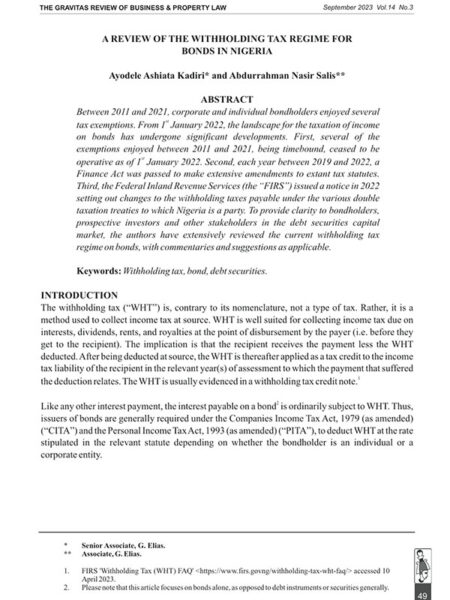
A Review of the Withholding Tax Regime for Bonds in Nigeria
0₦2,500.00Ayodele Ashiata Kadiri and Abdurrahman Nasir Salis, in their article, A Review of the Withholding Tax Regime for Bonds in Nigeria, examine the withholding tax regime for bonds in Nigeria. They underscore the state of tax exemptions for bondholder between 2011 and 2021. However, from 1st January 2022, the landscape for the taxation of income on bonds has undergone significant developments. First, a number of the exemptions enjoyed between 2011 and 2021, being time bound, ceased to be operative as of 1st January 2022. Second, each year between 2019 and 2022, a Finance Act was passed to make extensive amendments to extant tax statutes. Third, the Federal Inland Revenue Services (the “FIRS”) issued a notice in 2022 setting out changes to the withholding taxes payable under the various double taxation treaties which Nigeria is a party to. In order to provide clarity to bondholders, prospective investors and other stakeholders in the debt securities capital market, the authors have extensively reviewed the current withholding tax regime on bonds, with commentaries and suggestions as applicable.
-
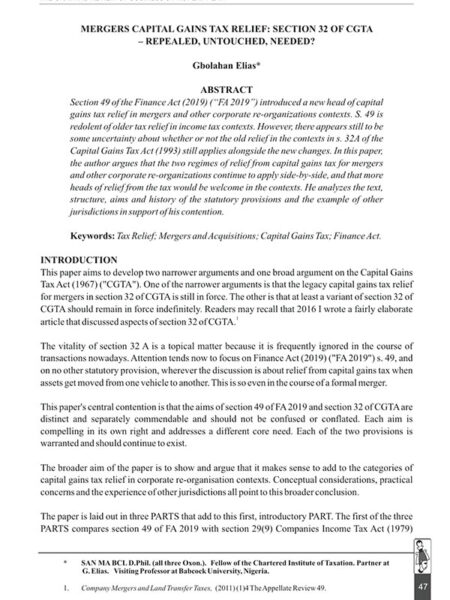
Mergers Capital Gains Tax Relief: CGTA Section 32A — Repealed, Untouched, Needed?
0₦2,500.00Professor Gbolahan Elias, SAN, Principal G.E. Elias & Co. in his article, Mergers Capital Gains Tax Relief: CGTA Section 32A — Repealed, Untouched, Needed? revisits the issue of Capital Gains Tax Reliefs in mergers and acquisitions. He explains the ambit of Section 49 of the Finance Act (2019) (“FA 2019”) which introduced a new head of capital gains tax relief in mergers and other corporate re-organizations contexts. He compares the provision with section 49 in the 1993 Capital Gains Tax Act and identifies ambiguity about whether or not the old relief in the contexts in Section 32A of the Capital Gains Tax Act (1993) still applies alongside the new changes. Professor Elias argues that the two regimes of relief from capital gains tax for mergers and other corporate re-organizations continue to apply side-by-side, and that more heads of relief from the tax would be welcomed. He analyzes the text, structure, aims and history of the statutory provisions and the example of other jurisdictions in support of his contention.
-

A “Deeper Dive”: The New Deduction of Tax at Source (Withholding) Regulations, 2024
0₦2,500.00Stephen Arubike and Adeyinka Adeoye in their article, A “Deeper Dive”: The New Deduction of Tax at Source (Withholding) Regulations, 2024, provide a comprehensive analysis of the Deduction of Tax at Source (Withholding) Regulations, 2024 (the “Regulations”), issued by Nigeria’s Minister of Finance and the Coordinating Minister of the Economy. Effective from January 1, 2025, the Regulations replace previous regulations on the subject, introduce several significant changes to the country’s withholding tax (WHT) regime. Key provisions include adjustments to applicable tax rates, expanded coverage of taxable entities, and a new emphasis on taxpayer identification numbers (TINs) to drive compliance. Arubike and Adeoye also address critical legal concerns raised by the Regulations, including conflicts with primary statutes, overreach in the Minister’s authority, and the unfair imposition of penalties on non-resident companies. While the Regulations aim to simplify WHT processes, reduce tax burdens on small businesses, and enhance tax compliance, several ambiguities and issues remain, particularly regarding non-resident taxation and penalties for non-compliance. Arubike and Adeoye conclude by discussing the transition period and its potential implications, as well as the need for further clarification on certain provisions to ensure fairness and legal consistency in implementing the Regulations.
-
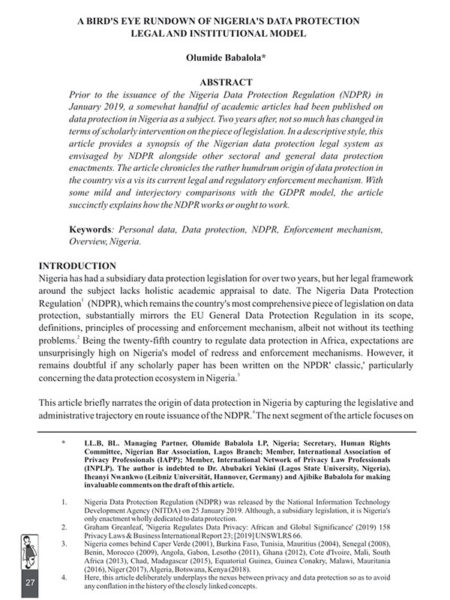
A Bird’s Eye Rundown of Nigeria’s Data Protection Legal and Institutional Model
0₦2,500.00Olumide Babalola of Olumide Babalola LP, in his article, A Bird’s Eye Rundown of Nigeria’s Data Protection Legal and Institutional Model, provides a synopsis of legislation and regulations dealing with data protection in Nigeria. He chronicles the rather humdrum origin of data protection in the country vis-a-vis its current legal and regulatory enforcement mechanism. Through comparisons with the General Data Protection Regulation (GDPR) model, Olumide explains how the Nigeria Data Protection Regulation (NDPR) works or ought to work.
-
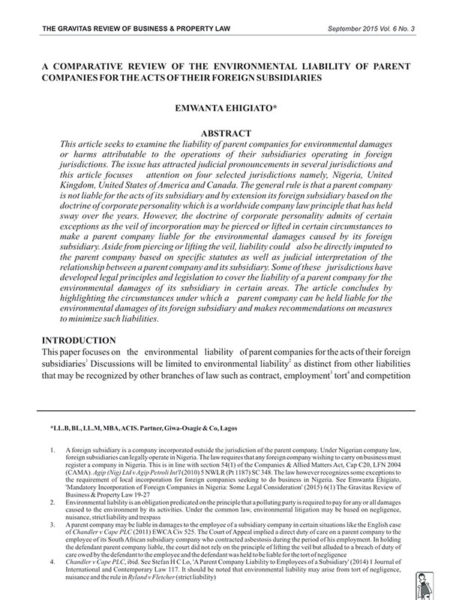
A Comparative Review of the Environmental Liability of Parent Companies for the Acts of their Foreign Subsidiaries
0₦2,500.00Emwanta Ehigiato, Partner, Giwa-Osagie & Co in “A Comparative Review of the Environmental Liability of Parent Companies for the Acts of their Foreign Subsidiaries” examines the liability of parent companies for the acts of their foreign subsidiaries especially in cases of environmental infractions. He gives a robust overview of corporate liability in several jurisdictions while analysing the state of the law in Nigeria.
-
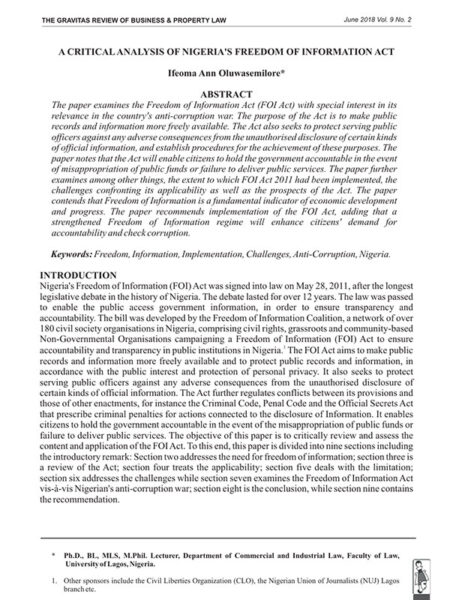
A Critical Analysis of Nigeria’s Freedom of Information Act
0₦2,500.00Dr. Ifeoma Oluwasemilore, Lecturer, Department of Commercial and Industrial Law, Faculty of Law, University of Lagos in her article, A Critical Analysis of Nigeria’s Freedom of Information Act, examines the Freedom of Information Act (FOI Act) with special interest in its relevance in the country’s anti-corruption war. She examines the extent to which FOI Act had been implemented, the challenges confronting its applicability as well as the prospects of the Act. She contends that Freedom of Information is a fundamental indicator of economic development and progress, and recommends a strengthened implementation of the Act, adding that a strong Freedom of Information regime will enhance citizens’ demand for accountability and check corruption.
-
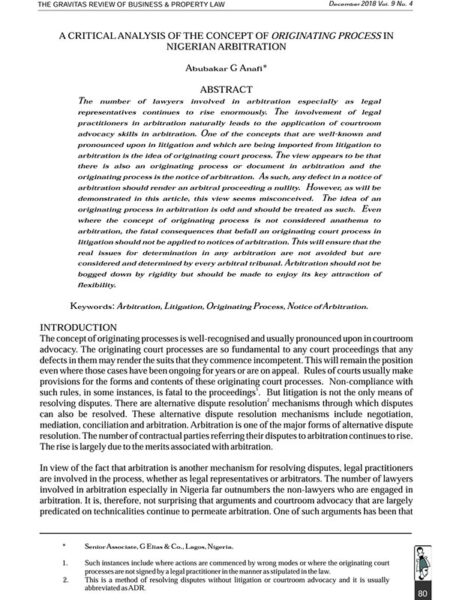
A Critical Analysis of the Concept of Originating Process in Nigerian Arbitration
0₦2,500.00Abubakar Anafi, Senior Associate, G Elias & Co in his article, A Critical Analysis of the Concept of Originating Process in Nigerian Arbitration, observes that the concept of ‘Originating Process’ which is well known in litigation with its strict parameters and devastating consequences, is already percolating the calm, simple and flexible waters of arbitration. Anafi lists 10 reasons why the concept is inapplicable in arbitration. He cautions against imitation of rigid rules of litigation which would ultimately derail the flexibility of the arbitral process.
-
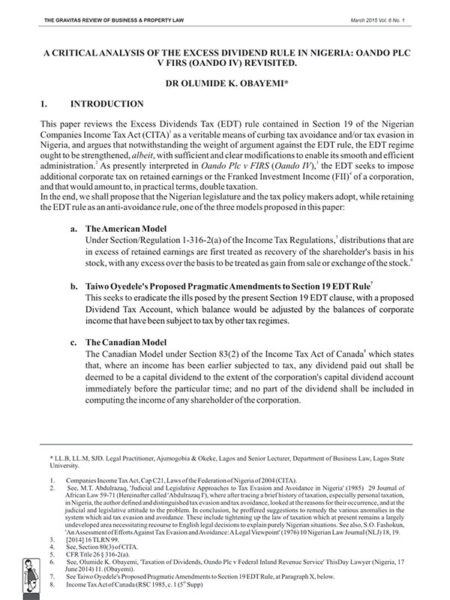
A Critical Analysis of the Excess Dividend Rule in Nigeria: Oando Plc v. FIRS (Oando IV) Revisited
0₦2,500.00Dr Olumide Obayemi, Senior Lecturer, Lagos State University and legal practitioner with Ajumogobia & Okeke, examines whether additional tax on retained earnings of companies amounts to double taxation in “A Critical Analysis of the Excess Dividend Rule in Nigeria: Oando v FIRS (Oando IV) Revisited”.
-
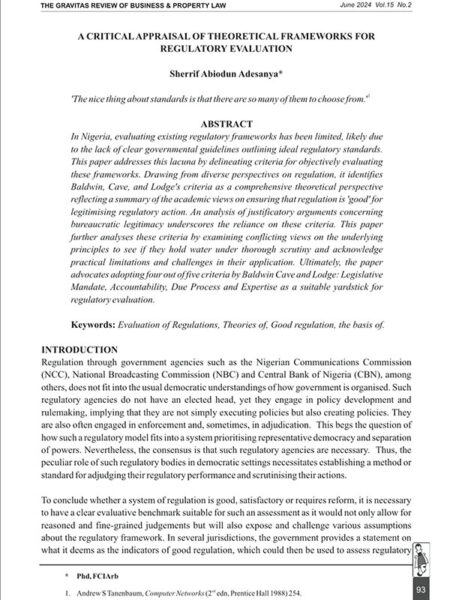
A Critical Appraisal of Theoretical Frameworks for Regulatory Evaluation
0₦2,500.00Sherrif Abiodun Adesanya, in his article, A Critical Appraisal of Theoretical Frameworks for Regulatory Evaluation, posits the need to have a theoretical basis for the evaluation of existing regulatory frameworks. Adesanya provides a set of criteria for the objective evaluation of these frameworks. Drawing from diverse perspectives on regulation, he identifies Baldwin, Cave, and Lodge’s criteria as a comprehensive theoretical perspective reflecting a summary of the academic views on how to ensure that regulation is ‘good’ for the purpose of legitimising regulatory action. An analysis of justificatory arguments concerning bureaucratic legitimacy underscores the reliance on these criteria. Adesanya analyses these criteria further by examining conflicting views on the underlying principles to see if these criteria hold water under thorough scrutiny and acknowledging practical limitations and challenges in their application. Ultimately, Adesanya advocates for the adoption of four out of five criteria put forth by Baldwin Cave and Lodge namely: Legislative Mandate, Accountability, Due Process and Expertise as a suitable yardstick for regulatory evaluation.
-
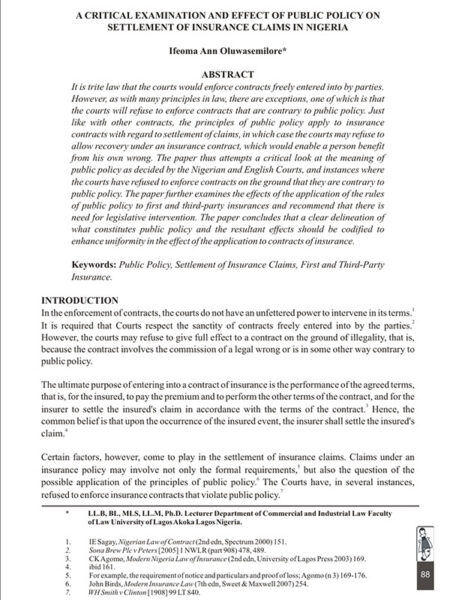
A Critical Examination and Effect of Public Policy on Settlement of Insurance Claims in Nigeria
0₦2,500.00Dr Ifeoma Oluwasemilore of the Department of Commercial and Industrial Law Faculty of Law University of Lagos, Akoka Lagos, Nigeriain her article, A Critical Examination and Effect of Public Policy on Settlement of Insurance Claims in Nigeria, attempts a critical look at the meaning of public policy as decided by the Nigerian and English Courts, and instances where the courts have refused to enforce contracts on the ground that they are contrary to public policy. Oluwasemilore further examines the effects of the application of the rules of public policy to first and third-party insurances and advocates a clear delineation and codification of what constitutes public policy to enhance uniformity in the effect of its application to contracts of insurance.
-
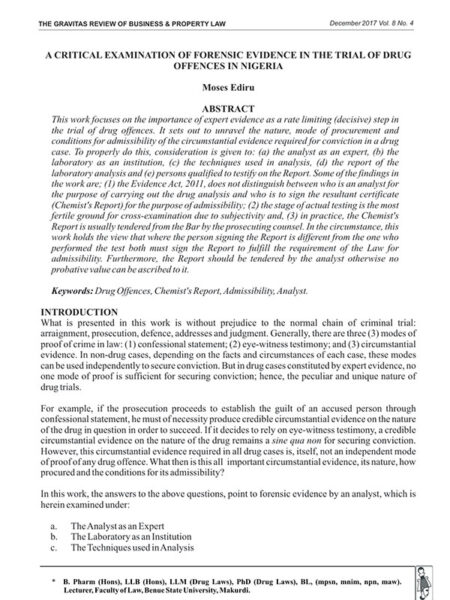
A Critical Examination of Forensic Evidence in the Trial of Drug Offences in Nigeria
0₦2,500.00Dr. Moses Ediru of the Benue State University, Makurdi, in his article, “A Critical Examination of Forensic Evidence in the Trial of Drug Offences in Nigeria”, unravels the nature , mode of procurement, and conditions for admissibility of circumstantial evidence required for conviction in a drug case. He considers salient evidential issues that should engage the attention of counsel in trial of drug offences including the role of the analyst as an expert, the laboratory as an institution, the techniques used in analysis, the report of the laboratory analysis, and persons qualified to testify on the Report.
-
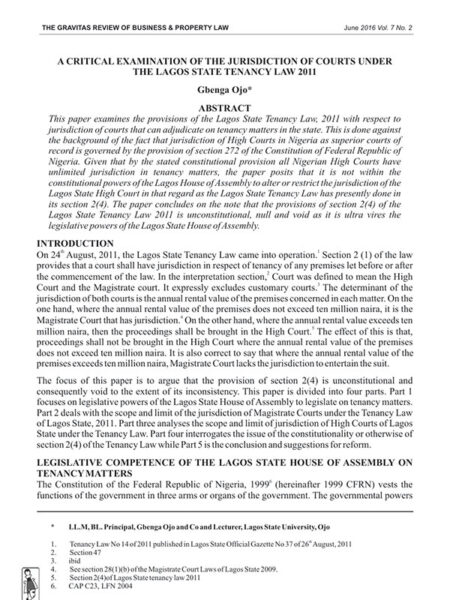
A Critical Examination of the Jurisdiction of Courts under the Lagos State Tenancy Law 2011
0₦2,500.00Against the background of the Tenancy Law of Lagos State 2011, Olagoke Odubunmi, Lagos based legal practitioner, in his article “Unmasking the Legal Complexities in the Termination of Fixed and Periodic Tenancies” seeks to unravel the complexities, technicalities and slippery landmines into which legal practitioners, property managers, agents and landlords, do unsuspectingly often fall into in the process of recovery of premises, most especially in the termination of fixed and periodic tenancies.
The Gravitas Review of Business & Property Law


